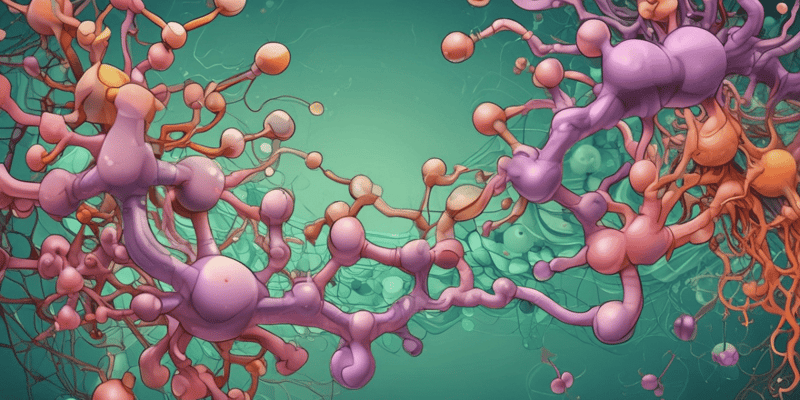Questions and Answers
What type of reaction joins monomers by chemical bonds with the elimination of a water molecule?
Condensation reaction
Which polysaccharide is formed by the condensation of beta glucose?
Cellulose
What type of molecule is the main substrate for respiration?
Monosaccharide
Which disaccharide is formed by the condensation of glucose and fructose?
Signup and view all the answers
What characteristic of amylopectin makes it rapidly digestible by enzymes?
Signup and view all the answers
Which molecule is the main energy storage molecule in animals?
Signup and view all the answers
What is the main reason why water is considered a polar molecule?
Signup and view all the answers
How does the high heat specific capacity of water benefit living organisms?
Signup and view all the answers
Which property of water enables it to provide a cooling effect through evaporation?
Signup and view all the answers
What role does water play in the formation and breaking of chemical bonds in metabolic reactions?
Signup and view all the answers
How does the strong cohesion between water molecules contribute to its function in tube-like transport cells?
Signup and view all the answers
Study Notes
Water Molecule
- Water is a polar molecule due to uneven distribution of charge within the molecule, with hydrogen atoms being more positive than the oxygen atom.
- It has a high heat specific capacity, requiring a lot of energy to warm it up, which minimizes temperature fluctuations in living things.
- Water has a relatively large latent heat of vaporization, providing a cooling effect with little water loss during evaporation.
- Strong cohesion between molecules enables effective transport of water in tube-like transport cells.
- Maximum density of water is at 4°C, making ice less dense and causing it to float on top of water, creating an insulating layer.
Monomers and Polymers
- Monomers are small units that are components of larger molecules, such as monosaccharides, amino acids, and nucleotides.
- Polymers are molecules made from monomers joined together by chemical bonds.
- Condensation reactions join monomers by eliminating a water molecule, while hydrolysis is the opposite, breaking a chemical bond between two molecules by adding water.
Carbohydrates
- Carbohydrates consist only of carbon, hydrogen, and oxygen and are long chains of sugar units called saccharides.
- There are three types of saccharides: monosaccharides, disaccharides, and polysaccharides.
- Monosaccharides, such as glucose, can join together to form disaccharides and polysaccharides by glycosidic bonds.
Monosaccharides
- Glucose is a monosaccharide containing six carbon atoms, and is the main substrate for respiration.
- It has two isomers: alpha and beta glucose.
Disaccharides
- Maltose is a disaccharide formed by condensation of two glucose molecules.
- Sucrose is a disaccharide formed by condensation of glucose and fructose.
- Lactose is a disaccharide formed by condensation of glucose and galactose.
Polysaccharides
- Polysaccharides are formed from many glucose units joined together.
- Glycogen is the main energy storage molecule in animals, formed from many alpha glucose molecules joined together by 1, 4 and 1, 6 glycosidic bonds.
- Starch stores energy in plants, and is a mixture of amylose and amylopectin.
- Amylose is an unbranched chain of glucose molecules joined by 1, 4 glycosidic bonds, making it a compact molecule.
- Amylopectin is branched, made up of glucose molecules joined by 1, 4 and 1, 6 glycosidic bonds, allowing for rapid digestion by enzymes.
Studying That Suits You
Use AI to generate personalized quizzes and flashcards to suit your learning preferences.
Description
Learn about the significance of water in biological systems, including its role as a polar molecule, metabolite, and solvent in metabolic reactions. Explore how water facilitates the formation and breaking of chemical bonds.




